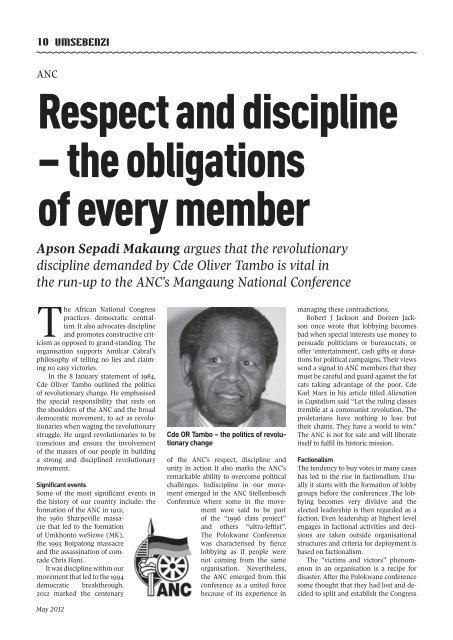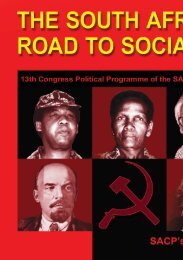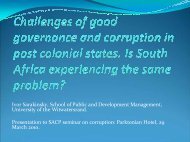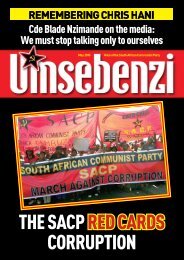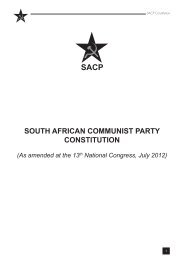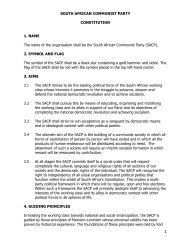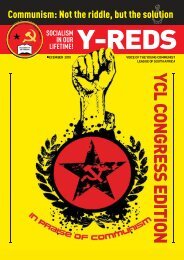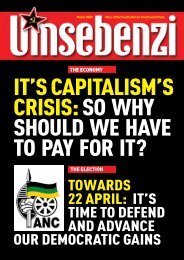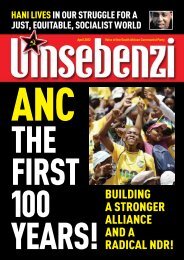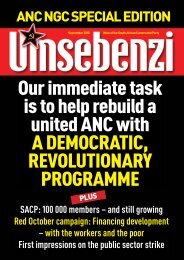A sea of red - South African Communist Party
A sea of red - South African Communist Party
A sea of red - South African Communist Party
Create successful ePaper yourself
Turn your PDF publications into a flip-book with our unique Google optimized e-Paper software.
ANC<br />
Respect and discipline<br />
– the obligations<br />
<strong>of</strong> every member<br />
Apson Sepadi Makaung argues that the revolutionary<br />
discipline demanded by Cde Oliver Tambo is vital in<br />
the run-up to the ANC’s Mangaung National Conference<br />
The <strong>African</strong> National Congress<br />
practices democratic centralism.<br />
It also advocates discipline<br />
and promotes constructive criticism<br />
as opposed to grand-standing. The<br />
organisation supports Amilcar Cabral’s<br />
philosophy <strong>of</strong> telling no lies and claiming<br />
no easy victories.<br />
In the 8 January statement <strong>of</strong> 1984,<br />
Cde Oliver Tambo outlined the politics<br />
<strong>of</strong> revolutionary change. He emphasised<br />
the special responsibility that rests on<br />
the shoulders <strong>of</strong> the ANC and the broad<br />
democratic movement, to act as revolutionaries<br />
when waging the revolutionary<br />
struggle. He urged revolutionaries to be<br />
conscious and ensure the involvement<br />
<strong>of</strong> the masses <strong>of</strong> our people in building<br />
a strong and disciplined revolutionary<br />
movement.<br />
Significant events<br />
Some <strong>of</strong> the most significant events in<br />
the history <strong>of</strong> our country include: the<br />
formation <strong>of</strong> the ANC in 1912,<br />
the 1960 Sharpeville massacre<br />
that led to the formation<br />
<strong>of</strong> Umkhonto weSizwe (MK),<br />
the 1993 Boipatong massacre<br />
and the assassination <strong>of</strong> comrade<br />
Chris Hani.<br />
It was discipline within our<br />
movement that led to the 1994<br />
democratic breakthrough.<br />
2012 marked the centenary<br />
May 2012<br />
Cde OR Tambo – the politics <strong>of</strong> revolutionary<br />
change<br />
<strong>of</strong> the ANC’s respect, discipline and<br />
unity in action It also marks the ANC’s<br />
remarkable ability to overcome political<br />
challenges. Indiscipline in our movement<br />
emerged in the ANC Stellenbosch<br />
Conference where some in the movement<br />
were said to be part<br />
<strong>of</strong> the “1996 class project”<br />
and others “ultra-leftist”.<br />
The Polokwane Conference<br />
was characterised by fierce<br />
lobbying as if people were<br />
not coming from the same<br />
organisation. Nevertheless,<br />
the ANC emerged from this<br />
conference as a united force<br />
because <strong>of</strong> its experience in<br />
managing these contradictions.<br />
Robert J Jackson and Doreen Jackson<br />
once wrote that lobbying becomes<br />
bad when special interests use money to<br />
persuade politicians or bureaucrats, or<br />
<strong>of</strong>fer ‘entertainment’, cash gifts or donations<br />
for political campaigns. Their views<br />
send a signal to ANC members that they<br />
must be careful and guard against the fat<br />
cats taking advantage <strong>of</strong> the poor. Cde<br />
Karl Marx in his article titled Alienation<br />
in Capitalism said “Let the ruling classes<br />
tremble at a communist revolution. The<br />
proletarians have nothing to lose but<br />
their chains. They have a world to win.”<br />
The ANC is not for sale and will liberate<br />
itself to fulfil its historic mission.<br />
Factionalism<br />
The tendency to buy votes in many cases<br />
has led to the rise in factionalism. Usually<br />
it starts with the formation <strong>of</strong> lobby<br />
groups before the conferences .The lobbying<br />
becomes very divisive and the<br />
elected leadership is then regarded as a<br />
faction. Even leadership at highest level<br />
engages in factional activities and decisions<br />
are taken outside organisational<br />
structures and criteria for deployment is<br />
based on factionalism.<br />
The “victims and victors” phenomenon<br />
in an organisation is a recipe for<br />
disaster. After the Polokwane conference<br />
some thought that they had lost and decided<br />
to split and establish the Congress


